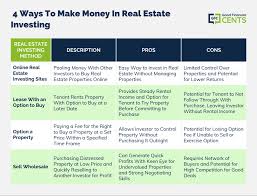Invest in Real Estate Without Buying Property
Real estate investment has long been considered a lucrative opportunity to build wealth and secure financial stability. While traditional real estate investing involves purchasing properties, there are alternative ways to invest in real estate without the need to buy physical assets.
Real Estate Investment Trusts (REITs)
One popular way to invest in real estate without buying property is through Real Estate Investment Trusts (REITs). REITs are companies that own, operate, or finance income-producing real estate across a range of sectors. By investing in REITs, individuals can gain exposure to the real estate market without the hassle of property management.
Crowdfunding Platforms
Another innovative method for investing in real estate without owning property is through crowdfunding platforms. These platforms allow investors to pool their resources and invest in a variety of real estate projects, from residential developments to commercial properties. Crowdfunding offers diversification and accessibility to real estate investments that may not be feasible for individual investors.
Real Estate Notes
Investing in real estate notes is another way to participate in the real estate market without directly owning property. Real estate notes are debt instruments secured by a mortgage or deed of trust, providing investors with regular interest payments and potential returns upon maturity.
Conclusion
While buying physical property remains a popular choice for real estate investment, there are alternative avenues available for those looking to diversify their portfolios or avoid the responsibilities of property ownership. By exploring options such as REITs, crowdfunding platforms, and real estate notes, investors can access the benefits of the real estate market without the need to buy property directly.
Exploring Real Estate Investment: Key Questions on Non-Ownership Strategies, Starting Small, and Passive Opportunities
- Why not to invest in real estate?
- How to start investing in real estate without a lot of money?
- What is the 2% rule in real estate?
- Is $5000 enough to invest in real estate?
- How do you become a passive real estate investor?
Why not to invest in real estate?
When considering real estate investment, it’s important to acknowledge that it may not be suitable for everyone. One reason some individuals choose not to invest in real estate is the level of commitment and responsibility involved in property ownership. Managing tenants, property maintenance, and market fluctuations can be time-consuming and stressful. Additionally, real estate investments are not as liquid as other forms of investment, meaning that selling a property may take time and could result in financial losses if the market conditions are unfavorable. For those seeking more flexibility or less hands-on involvement in their investments, exploring alternative options like Real Estate Investment Trusts (REITs) or crowdfunding platforms may be a better fit.
How to start investing in real estate without a lot of money?
Investing in real estate without a significant amount of capital is a common concern for many aspiring investors. One approach to start investing in real estate with limited funds is to explore options like Real Estate Investment Trusts (REITs), which allow individuals to invest in a diversified portfolio of properties without the need for substantial upfront investment. Additionally, crowdfunding platforms provide opportunities for pooling resources with other investors to participate in real estate projects with lower financial barriers to entry. Another strategy is to consider real estate notes, where investors can earn returns through debt instruments secured by property assets. By leveraging these alternative investment avenues, individuals can begin their real estate investment journey even with limited initial capital.
What is the 2% rule in real estate?
The 2% rule in real estate is a guideline used by investors to assess the potential profitability of a rental property. According to this rule, a property’s monthly rental income should be at least 2% of its total purchase price. For example, if a property is purchased for $100,000, it should generate a minimum monthly rental income of $2,000 to meet the 2% rule criteria. This rule helps investors quickly evaluate whether a property has the potential to generate sufficient cash flow to cover expenses and provide a desirable return on investment without the need to buy additional properties.
Is $5000 enough to invest in real estate?
Investing in real estate with $5000 is possible through alternative methods that do not require purchasing property outright. Options such as Real Estate Investment Trusts (REITs), crowdfunding platforms, and real estate notes offer opportunities to enter the real estate market with a smaller initial investment. By leveraging these avenues, investors can diversify their portfolios and potentially generate returns without the need for a substantial upfront capital typically associated with traditional property purchases. It’s essential to research and understand the risks and potential rewards of each investment option before committing funds to ensure a strategic approach to building wealth through real estate.
How do you become a passive real estate investor?
Becoming a passive real estate investor involves exploring alternative investment opportunities that allow individuals to participate in the real estate market without the active involvement typically associated with property ownership. One common approach is to invest in Real Estate Investment Trusts (REITs), which offer investors the chance to own shares in real estate assets managed by professionals. Another option is investing in real estate crowdfunding platforms, where individuals can pool their resources with others to fund various real estate projects. By choosing these passive investment avenues, individuals can benefit from the potential returns of real estate without the day-to-day responsibilities of property management.
Tags: 2 rule, capital, commitment, crowdfunding platforms, flexibility, invest in real estate without buying property, liquidity, profitability, property ownership, real estate investment trusts reits, real estate notes, rental property, responsibility
